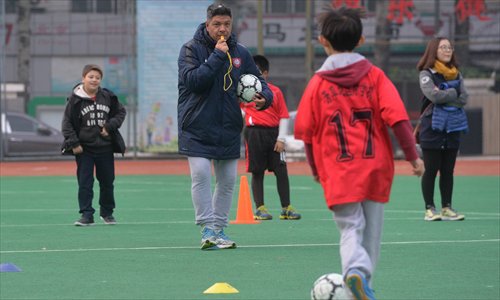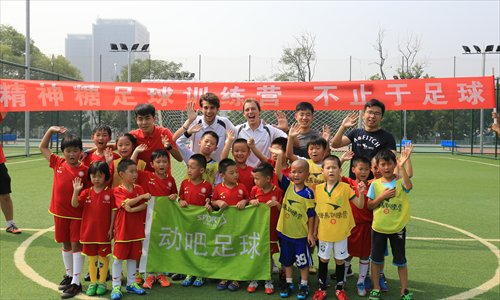Foreign trainers kickstart Chinese soccer
International coaches march into primary and middle schools in Beijing

A soccer coach from Argentina guides children at a local school in Beijing in October. Photo: CFP
The first time Jeff Young attended the Physical Education (PE) class at a local primary school in Beijing, he was stunned by something he never met before - 50 smiling children to be guided.
Young, 36, who comes from the US, had intensive soccer coaching experiences with children across Europe after he spent years in the Netherlands acquiring the trainer instructor license of the Union of European Football Associations (UEFA).
"In Europe, the sizes of training classes are much smaller," said Young. "But there are more similarities than differences between Chinese children and their European counterparts."
For the past five months, Young, the football supervisor at Sports 8, a start-up venture specializing in promoting grassroots soccer in China, has been working with international coaches, mostly from the Netherlands, in bringing the Dutch youth soccer system to China. Globally, the Dutch soccer system is well-known for producing an abundant number of soccer stars including Wesley Sneijder, No. 10 of the Dutch national soccer team, and one of the co-founders of Sport 8.
Young is not alone among the international soccer coaches flocking to China to develop their profession, amid China's soccer fever. In October, five football coaches from Argentina, invited by the Beijing Municipal Commission of Education, have been dispatched to local elementary and middle schools to help train children and guide PE teachers.

Foreign coaches are invited to help raise the enthusiasm of soccer for Chinese children. Photo: IC
The reform of PE education
For the past few decades, soccer training for youth was the work of the country's sports authorities. That changed in 2014, when the Ministry of Education took it over. The campaign of promoting soccer among youth was kicked off after adding soccer into the PE curriculum at primary and secondary schools. In addition, the ministry brought over foreign soccer coaches, adopted foreign training systems, and sent Chinese PE teachers for further study overseas.
"I love that what we are doing is important in China, to build the enthusiasm for soccer among the kids. We are pushing it heavily," said Young.
In June, Young decided to take the opportunity to go to China after noticing a piece of news featuring Sneijder and Chinese football, which aired on a Dutch TV station. He went on to Twitter and Facebook and found the job recruiting information posted by Sneijder. Young, who was about to conclude his contract with a school in Latvia, flew to Amsterdam for the job interview, and eventually became one the six foreign coaches on a long-term contract arriving in China. Other coaches came from Germany and the Netherlands.
Young's team focuses on developing children's passion and creativity in soccer, guiding the students to their own discovery of soccer. "It's not like you reproduce what I tell you to do. It's more like you produce your own work based on your understanding of the game."
Bai Qiang, co-founder and CEO of Sport 8, says that China is in great need of foreign soccer coaches for children because "Chinese soccer is too poor to have any credibility. The students, parents and PE teachers can't do anything about it but choose to believe in foreign coaches."
"We found that on a lot of occasions, children were inactive and lazy in the PE class taught by Chinese teachers but they can be more intrigued and proactive when a foreign coach comes," said Bai. "When the coaches feel they are greatly respected and appreciated by students and parents, they do better. They have more passion in teaching than a lot of Chinese coaches."
Meanwhile, soccer coaches in schools are very important because they are not only teaching a sport program but act as a role model for children. "For example, while some of the Chinese PE teachers would be late, smoke or punish children on the playground, foreign teachers are more professional. The package of guidance a good foreign coach can offer is not only about soccer skills, but also the overall qualities of their own behaviors."

Two foreign soccer coaches from Sport 8 pose for a photo with children in Beijing. Photo: Courtesy of Sport 8
Taking jobs away?
When Chinese soccer teacher Che Ji, 34, was informed by a colleague that the primary school he works for would have a visiting foreign soccer teacher in November, he was stricken by complex sentiments.
Che was skeptical about how the foreign coaches could help raise the soccer ability of children at the primary school level, given the fact that foreign coaches in the countries' professional soccer league don't work out very well.
"The background of some foreign coaches [in schools] is quite common. They can acquire the international soccer coaching certificate because they speak English while a lot Chinese teachers can't," he said.
Che, a Beijing native who used to be a professional footballer and graduated from Beijing Sports University, was employed as a soccer coach at the primary school in Mentougou district in September. He is one of China's domestic soccer coaches who are also benefiting from more job opportunities. In the coming three years, Beijing will build 200 specialty soccer schools which provide special soccer training in PE classes. "In 2000, the salary for a school soccer teacher was 800 yuan ($126), on which people could hardly make a living, and many went to other industries. Today, I heard there are more than 2,000 people queuing in line to get a coach certificate," he said.
In Che's opinion, what the foreign coaches can bring to Chinese children is the philosophy that "playing soccer is exciting and happy." The philosophy works well overseas because foreigners usually don't care about competition results. However, in China, even primary schools would set goals for their soccer team to win competitions, which gives more pressure to both coaches and students. "Some of the parents are keen on foreign soccer coaches because they think their children can learn English from them," he added.
Youth sport
Guo Jianjun, former director of the Youth Sport Research and Development Center of the China Institute of Sports Science, has experience in working with foreign coaches in training Chinese children. But he said the contribution foreign soccer coaches can make is very limited, as their training regimes can't be fully implemented because Chinese parents and children always put priority on academics over sports and the children's physical health.
"For example, when children learn a new skill they should highly concentrate. In Chinese schools, children are gathered for a soccer class after a whole day of academic study, which can be very exhausting. Many foreign coaches complain that they don't have the right time for training," said Guo.
Meanwhile, soccer is a sport that requires not only foot techniques but also upper body strength. While in foreign countries children can practice body strength by themselves with buddies after a soccer class, in China most the afterschool time of children is occupied by academic studies.
"A lot of parents send their children to play soccer because soccer skills can help them enter a better school," said Guo. "Chinese people should adjust their attitude and place value on sports. Health should come as the priority rather than academic study."
Over the past decades, China has seen a rise in chronic disease among children. The 2014 Beijing Health White Paper indicates a rise of high blood pressure and diabetes among young people. "We can only change the situation by changing our lifestyle and encouraging more children to do regular exercise, otherwise Chinese people will be called 'the sick men of East Aisa' again," warned Guo.
Chinese leaders pay special attention to soccer because they believe that promoting soccer can serve as an important approach to help raise the quality of Chinese people, said Guo.
Soccer communities
People's opinion over the effectiveness of foreign soccer teachers coming to local schools is divided, but many agree that giving training and guidance to China's PE teachers is necessary.
Bai plans to provide training in the Dutch soccer system to a larger number of people than PE teachers at schools. Many Chinese parents are concerned the most over the safety of their children in outdoor activities. Bai says the community soccer instructors trained under the Dutch system can guarantee the safety of children and provide guidance.
"In countries with advanced soccer culture, footballers grow up by playing soccer in their neighborhoods and communities with other kids and their parents. We are in need of adults who love soccer and are willing to spend time playing and coaching children," said Bai. "Only if more people participate in the sport can China have a better soccer culture."
"I also hope the country can have more flexible visa policies to invite more international soccer coaches," said Bai.
As he stays longer in China, Young's understanding of China's soccer is gradually growing. He has traveled to different places across China to give classes to children and PE teachers, and believes what he is engaged is productive and meaningful.
"We are finding our paths, trying to make our education system adaptable and useful to children, teachers and cultures here in China," said Young. "If you haven't see coaches outside of China, you don't see what the possibility can be. When you see how others doing it with your eyes, it opens your mind, OK, that is achievable and what can be done with my group."